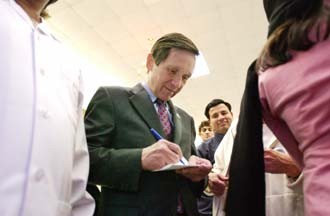| Democratic presidential candidate Dennis Kucinich addressed issues of peace and civil liberties at a gathering of San Antonio's Muslim community on March 5. (Photo by Mark Greenberg) |
It was shortly before 8 p.m. last Friday evening, and Dennis Kucinich looked a tad wan. His blue pinstriped suit was crisp, but his heavy eyelids were those of a man who has spent the better part of a year hopscotching across America on the campaign trail - or someone who was getting sick, which happened two days later. He seemed to need the respite, and he bowed and listened to Ali Moshirsadri recite from the Quo'ran, first in Arabic and then in English: " ... Let there be a community for you to do good. Do not be like those who split up and disagree ... "
A half hour later, a rejuvenated Kucinich sprang to life, and spoke with the passion of an itinerant preacher. "In the Quo'ran, we're admonished to not separate ourselves," he told a mostly Muslim crowd of more than 300 people, who occasionally responded to Kucinich's message by standing and chanting "God is great."
It was appropriate that Kucinich, who has made peace the center of his campaign, should address the Muslim community at the Knights of Columbus Hall, where plates of naan sat on a table below a shrine of the Virgin Mary, and men knelt on rugs for evening prayers.
"We should be united in love; that's the sense of community. We are experiencing this oneness here - a civic openness, an aspiration for peace, an aspiration for security."
Despite earning only 19 confirmed delegates as of the March 2 primaries, Kucinich remains in the race for the Democratic presidential nomination. Although the Ohio congressman's chances of winning are infinitesimal, his opposition to the Patriot Act and calls for peace have prompted many American Muslims to back him as their candidate.
"My campaign is about more than winning office," he said in his speech, which was largely unscripted. "We've backed ourselves into a corner and the rest of world looks at us with curiosity. Once again we need to be united create a new era of peace. We can all be peacemakers."
"Even if he doesn't win, he can represent our voice in Congress," said Sarwait Husain, chairwoman of the San Antonio chapter of the Council of American-Islam Relations.
"I tried to reach out to community and national leaders to meet the Muslim community. I was not that successful," added Husain. "The reason? We probably all know."
Since 9-11, Muslims have borne the brunt of Americans' insecurity, hatred, and suspicion: The U.S. government has detained many Muslims on immigration charges, imprisoning them for months without access to lawyers or family; law enforcement has spied on their places of worship and community centers; assailants have burned, shot, or destroyed their masjids (also known as mosques in English).
With the exception of Kucinich and Howard Dean, few political leaders have embraced the Muslim community, while fear, language barriers, and unfamiliarity with the U.S. voting system has deterred many Muslims from engaging in politics.
"We must turn knowledge into action," said Inayat Lalani of the Texas Muslim Democratic Caucus, explaining the political process to about 50 Muslims before Kucinich's arrival. "The Democratic Party, the Republican Party, they follow the rules. Unlike back home, where they change the rules as they go along."
Muslim leaders throughout the U.S. are realizing that to ensure their interests are represented in government, they have to place Muslims in positions of power and to support candidates such as Kucinich who will speak for them in Washington. "This is just the time to get out and get our needs known," said Husain, who also publishes a monthly newspaper for San Antonio's Muslim community, Al-Ittihaad. "We don't have to hide; we don't have to fight. It can be done successfully. Getting delegates to the conventions - that is the stepping stone to national politics and a voice in the political system."
About 60 percent of the 3 million Muslim adults in the U.S. are registered to vote, according to the Muslim Electorates' Council of America, a volunteer group of academics and voting activists. Slightly more than half are women; the largest ethnic Muslim voting bloc is South Asian (39 percent), followed by African Americans (27 percent), and Arabs (17 percent).
Since Kucinich announced his candidacy last year, he has consistently criticized Bush's decision to wage war on Iraq and promised to establish a Department of Peace - a proposal derided by more bellicose politicians. "Our leaders say, 'Don't do as we do, do as we say.' We build nuclear weapons, new biological, and chemical weapons, a missile shield, and yet tell others not to. We can't attack another country and ask others not to."
Kucinich compared Muslims in America to canaries in coal mines: bellwethers of the U.S. government's "intolerance, surveillance, and oppression" of all citizens.
"Most members of Congress never looked at the Patriot Act, but voted for it because it was called 'Patriot Act,' and it would seem patriotic," said Kucinich, who read the 346-page document and voted against it. "Fear separated Congress from their common sense."
Earlier that evening in Milam Park, Kucinich spoke energetically to supporters, but it is in intimate settings where his eloquence resonates most profoundly. "We must cherish and be with them `Muslims` in their suffering and defend them," he said, entering his 14th hour of campaigning. "In its suffering the Muslim community is helping America to transform. We're defending all Americans, all liberties. Stand up and live your faith: Celebrate Islam. Promote and share understanding. This country owes you a debt of gratitude." •


